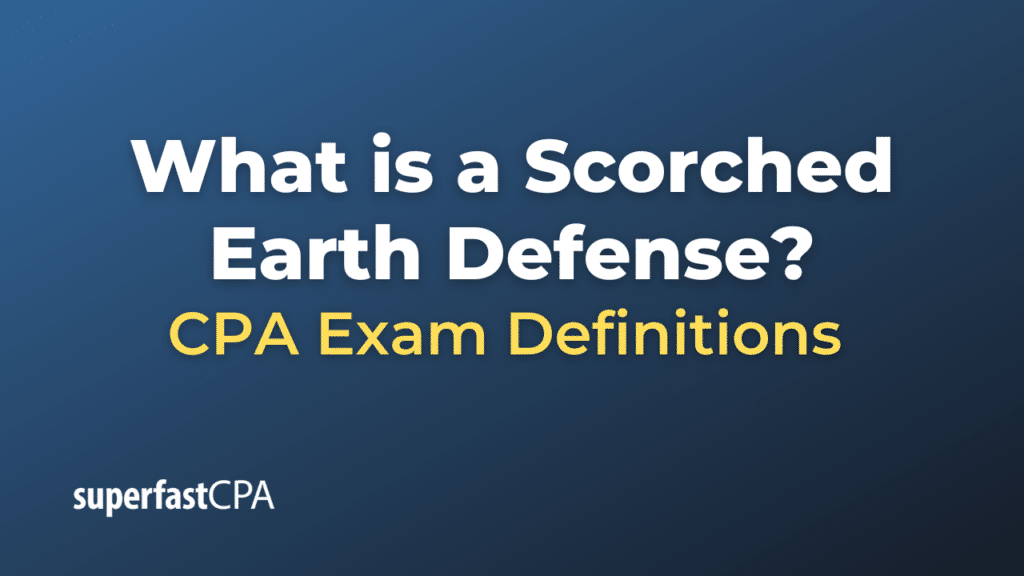Scorched Earth Defense
A “scorched earth defense” is a strategy often employed by companies to fend off hostile takeovers. The name is derived from the military strategy of “scorched earth,” where retreating forces destroy any assets that might be of use to the enemy. In the corporate world, the company that is the target of the takeover uses tactics that make the company less attractive or more costly for the acquiring entity.
Here are some tactics that companies might employ as part of a scorched earth defense:
- Asset Sales: The company might sell off valuable assets or divisions that are particularly appealing to the would-be acquirer, making the takeover less attractive.
- Acquisitions: The target company might make a major acquisition that could saddle it with debt or complicate the takeover.
- Golden Parachutes: These are lucrative benefits promised to executives if the company is taken over. They add to the cost of the takeover.
- Greenmail : This involves the target company buying back its own stock from the would-be acquirer at a premium. While this can be expensive for the target company, it can also deter the hostile party.
- Poison Pills: This is a popular method where shareholders (except the acquirer) are given rights to purchase more shares at a discount in the event of a takeover bid, diluting the acquirer’s stake and making the takeover more expensive.
- Crown Jewel Defense: Similar to asset sales, the company might threaten to sell off the most valuable parts (the “crown jewels”) of its business if a takeover attempt continues.
- Flip-in : This allows existing shareholders to buy shares at a discount, excluding the hostile party, which dilutes the acquirer’s stake.
- Pac-Man Defense: Named after the popular arcade game, this tactic involves the target company turning around and trying to acquire the company that initiated the hostile takeover.
- White Knight Defense: The target company seeks out a friendlier company or individual (the “white knight”) to counter the hostile takeover with a more favorable merger proposal.
- Suicide Pills (a.k.a. ‘Jonestown Defense’): An extreme version of the poison pill where the company takes on so much debt or engages in actions that could lead to its destruction, on the premise that the acquirer would not want a ruined company.
The scorched earth defense, by its nature, can be detrimental not just to the hostile bidder but also to the target company itself and its shareholders. Such defenses can erode shareholder value, lead to the loss of assets or employees, or result in excessive debt. As a result, the board of directors and management must carefully weigh the costs and benefits of these tactics and ideally act in the best interests of the shareholders.
Example of a Scorched Earth Defense
One of the most famous instances involving scorched earth tactics is the battle between Time Inc. and Warner Communications against Paramount Communications in the late 1980s.
Background:
In 1989, media company Time Inc. (known for its magazines) was in merger talks with Warner Communications (a major entertainment company). They believed that combining forces would position them strongly in the evolving media industry. However, before the deal could be finalized, Paramount Communications (another media giant) launched a hostile takeover bid for Time Inc.
Scorched Earth Tactics:
- White Knight: Time Inc. initially sought a friendly entity to make a counter-offer or intervene in the situation. However, this tactic was not successful.
- Change in Strategy: Originally, the merger between Time and Warner was to be a stock-for-stock deal. In a dramatic shift, Time countered Paramount’s takeover attempt by changing the merger into an outright acquisition of Warner. This meant that Time would take on significant debt to purchase Warner in cash.
- Massive Debt : To fend off Paramount, Time Inc. borrowed a huge amount of money to finance its acquisition of Warner. This added debt made Time Inc. a less attractive target for a takeover.
Outcome:
Despite a series of lawsuits and a public relations battle, Time’s scorched earth tactics ultimately proved successful. The massive debt taken on to buy Warner outright made Time Inc. less appealing to Paramount. Time Inc. and Warner Communications successfully merged, creating Time Warner, one of the largest media conglomerates in the world.
However, the victory came at a cost. The significant debt burden impacted Time Warner’s financial health and strategy for years.
This example highlights the lengths to which a company might go to defend itself against a hostile takeover. It also underscores the potential long-term consequences of such aggressive defense tactics.













